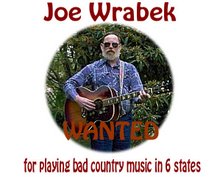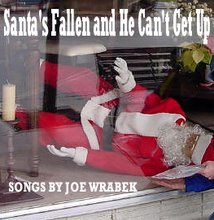The Willamette Writers gig in late July is a barbecue to benefit the children’s program. So… an hour’s worth of songs about writing (they specifically requested “The Writer’s Block Blues”), songs about food, and songs for kids. I looked through the “catalog,” and yes, I think I can do that.
The Rap can talk both about the craft of writing, and about inspiration. I did this some years back—gave a seminar on songwriting at the “Moograss” bluegrass festival, and used my performance later that day to illustrate points I’d made in the seminar.
Unlike a lot of writers, I deal in sound bites—my “stories,” as Eric John Kaiser calls them, have to fit in a 3.5-to-5-minute “box” and still express a complete thought with no loose ends. What that thought is is where inspiration comes in. How I deal with it is the craft. The humor, the looking at things sideways, the playing against type (songs about death need to be happy and upbeat, for instance) and expressing things in terms of roadkill are deliberate (and probably just attention-getting tactics).
I can give them examples of my more deliberate writing. (It really doesn’t all “just happen.”) “Leavin’ It to Beaver” was a counter to Jeff Tanzer’s “The Day the Earth Stood Still” (his song was a bunch of images from old movies, so mine was titles of old TV shows). “Twenty-Four Seven” sought to write a song that was entirely cliches (and incorporate the Plain English Society’s “worst cliches” list). “The Taboo Song” included the 15 things the Times of London said you couldn’t put in a song. And “The Writer’s Block Blues” was a deliberate (and successful) attempt to end a spate of writer’s block.
“Hey, Little Chicken” tried to answer the question, “Why did the chicken cross the road?” (It’s also a song about acquiring food—and this is a barbecue.) ”Earwigs in the Eggplant” was a love song combining an alphabetical list of garden vegetables, fruits and flowers with an alphabetical list of garden pests (and was the result of a suggestion that 45 Degrees North do “something about vegetables” at the Farmers Market gig).
Some of these answer the question, “Where does inspiration come from?” Like I said in one of the “Joe Show” videos, it comes from everywhere—you just have to keep eyes and ears open, and remember the world is a very strange place and people very weird critters.
“Eatin’ Cornflakes from a Hubcap Blues” resulted from a discussion on a writers’ site about the blues (it’s also about food, since the dog gets eaten). “I’m Giving Mom a Dead Dog for Christmas” came from a comment by Steve Goodman at a Bob Dylan concert, and “When They Die, I Put Them in the Cookies” from a comment somebody made after Bobbie Gallup and I wrote “Dead Things in the Shower” (I better include that one on the setlist, too). “Born-Again Barbie” happened because of a comment I made on one writers’ group’s announcement of a song contest about women of the Bible. And “The Cat with the Strat” was a poem—a Dr. Seuss parody I ended up having to set to music because a band wanted to record it.
Other lessons in all this? Don’t operate in a vacuum—people need to know what you do. (Other people have become the major source of my ideas.) Hang out, one way or another, with other writers; they’re peer review, and alternate perspectives. (And like economist Ben Stein used to say on his TV show, “Stay tuned—you might learn something.”) And be different. (They probably already know this.) You have to either be saying something new, or saying something old in a new way. There are umpty-billion people on the planet, and there’s a woman in China giving birth every 20 seconds. (Yes, I know—we must find this woman and stop her.) Why should people listen to you, and not somebody else?
That enough, maybe?
Joe
WELCOME...
This blog is the outgrowth of a songwriting workshop I conducted at the 2006 "Moograss" Bluegrass Festival in Tillamook, Oregon. It presumes that after 30-odd years of writing and playing music, I might have something to contribute that others might take advantage of. If not, it may be at least a record of an entertaining journey, and a list of mistakes others may be able to avoid repeating.
This blog is intended to be updated weekly. In addition to discussions about WRITING, it will discuss PROMOTION--perhaps the biggest challenge for a writer today--as well as provide UPDATES on continuing PROJECTS, dates and venues for CONCERTS as they happen, how and where to get THE LATEST CD, the LINKS to sites where LATEST SONGS are posted, and a way to E-MAIL ME if you've a mind to.
Not all these features will show up right away. Like songwriting itself, this is a work in progress. What isn't here now will be here eventually. Thank you for your interest and your support.
Subscribe to:
Post Comments (Atom)



No comments:
Post a Comment